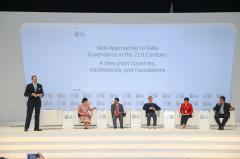UN World Data Forum 2018 Explores New Approaches To Data Governance, Data Stewardship And Happiness
“We are not here to just share best practice, but also challenges,” said experts at the first session kicking off day one of the UN World Data Forum 2018, organised by the Federal Competitiveness & Statistics Authority (FCSA) at Dubai’s Madinat Jumeirah on October 22-24, 2018.
Moderated by Craig Hammer, Programme Manager at the World Bank and Secretary of the World Bank’s Development Data Council, the first session – titled “New Approaches to Data
Governance in the 21st Century: A View from Countries, Multilaterals, and Foundations” – brought together Phetsamone Sone, Deputy Head of the Lao Statistics Bureau (LSB); Gopi Krishna Khanal, Joint Secretary at Nepal’s National Natural Resource and Fiscal Commission (NNRFC); Jake Porway, Founder and Executive Director of global non-profit DataKind; Haishan Fu, Director of the World Bank’s Development Data Group; and Fernando Perini, Senior Programme Officer at Canada’s International Development Research Centre (IDRC).
“We are here to share the challenges that we have faced and focus on plans for the next 10 years,” said Phetsamone Sone, asserting that these challenges can only be met with support coming from governments and international partners. Meanwhile, Gopi Krishna Khanal focused on lessons drawn from mining and compiling data to address national challenges, including: Institutionalising data science for evidence-based policy decisions; using modern technology to build and develop data; and embracing data governance at the functional and strategic levels.
“We work with our partners to ensure seamless data exchange and sharing,” noted Jake Porway, stressing that partnership and collaboration is essential in data science, particularly in DataKind’s efforts to use data science and AI in the service of humanity.
For her part, Haishan Fu stressed the importance of proactively engaging with the private sector in an effort to create a culture of data and knowledge sharing and ensure the best use of data, before Fernando Perini concluded the presentations tackling the issue of abuse of data by authoritarian governments and other parties who use data to manipulate public opinions and influence elections. “We cannot think of things in isolation anymore,” he said; “we need a more realistic approach to data governance.”
A parallel session titled “Data Stewardship in Action: Making Data Collaboratives Systematic, Sustainable and Responsible”, was moderated by Sarah Lucas of the Hewlett Foundation, and brought together Omar Seidu, Ghana Statistical Service; Chaya Nayak, Facebook; Claudia Juech, Cloudera Foundation; Kara Selke, Streetlight Data; Rami Hazime, DigitalGlobe; and Stefaan Verhulst, The Governance Lab at New York University.
The experts noted the great potential in combining privately held, non-traditional data sources to combine with traditional government data to solve developmental problems across a globe. While traditional government surveys can take years, privately held data can provide more regular metrics to inform policies. The challenge, they noted, is how to utilise this privately held data in an on-going, sustainable and responsible way.
“It is important to have technical infrastructure, data infrastructure and human infrastructure in place for these data collaborations to work,” Verhulst noted. “We need a community of data stewards to make data collaborations systematic, sustainable and responsible.”
Cost, data privacy and trust are key issues that must also be considered to ensure these data collaborations are sustainable. Verhulst notes that we must also understand the risk of not sharing data. “There are risks involved for a corporation not to engage with the public sector around data, because ultimately, utilising this data collection could mean improving lives, and even saving lives,” Verhulst explained.
The first day had opened with a session on “How Data Can Drive Happiness”, led by Dr Mansoor Anwar Habib, Senior Director of Employee Wellness and Happiness at du. Leading with the message of UAE Founding Father the late Sheikh Zayed bin Sultan Al Nahyan, who said “Positivity is a way of happiness and happiness is a lifestyle,” the session explored the various aspects and measures by which data can drive happiness.
“Emotions are contagious,” Dr Habib said, speaking of the correlation between the objectivity of data and subjectivity of happiness. To achieve the 2030 Agenda for Sustainable Development, the “Happy Wheel” breaks down the 5 domains to focus on for the ultimate goal of world happiness: Health; Around Me (relationships); Pause (being present in the moment); Purpose; and You (practicing gratitude), which together make up the acronym HAPPY.
The session ended with a Mindful Destressing Breathing Activity, engaging the audience and focussing on destress, group participation and engagement. “If we look at the 5 Domains of ‘HAPPY’ holistically and strive towards them, we will arrive at happiness – the GOAL,” Dr Habib concluded.
The second UN World Data Forum will welcome more than 1,500 data experts, policy-makers, and representatives from academia, private companies and civil society organisations (CSOs) from around the world. The event follows the inaugural Forum, which took place in 2017 in Cape Town, South Africa.









 Email: info@cyber-gear.com
Email: info@cyber-gear.com